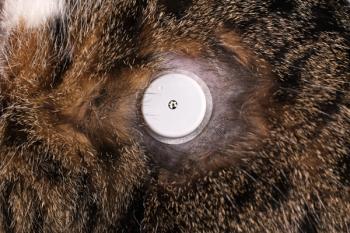
Machine learning enables prediction of early renal disease
Antech unveils RenalTech, a predictive tool for diagnosing kidney disease in cats, giving veterinarians unprecedented power to provide personalized care for their feline patients.
Dr. David Aucoin, CTO of Antech Diagnostics, discusses RenalTech, a new test that predicts whether a cat will develop chronic kidney disease, during a sponsored session at Fetch dvm360 conference in Kansas City. (Photo by Ryan Kramer.)Powered by artificial intelligence and machine learning, RenalTech is a new reference test from Antech Diagnostics and Imaging that enables veterinary practitioners to predict chronic kidney disease (CKD) in their feline patients up to two full years before the disease can be diagnosed. At
CKD is incredibly prevalent, and its etiology is currently unclear. “It's the leading cause of mortality in cats over age 5,” noted Dr. Aucoin, who is Antech's chief technology officer, “but it's usually so advanced by the time it's discovered that you can't do anything about it or learn how it develops in order to figure out how to prevent or treat it.”
Enter RenalTech.
How it was developed
RenalTech was created through a global collaboration led by the Mars Petcare family of companies, including the Waltham Centre for Pet Nutrition, Antech, Royal Canin, VCA and the Mars Advanced Research Institute, along with several external partners.
Dr. Aucoin explained that the power and reliability of RenalTech is based on 20 years of data from 150,000 cats treated at Banfield Pet Hospitals (including 50 breeds and 700,000 patient visits) and a whopping 600,000 computing hours.
The research team used a computer algorithm to whittle down 35 possible parameters, such as age, sex, breed, signalment and various lab values, to focus on six laboratory parameters-blood urea nitrogen (BUN), creatinine, urine specific gravity, urine protein, urine pH and white blood cell count-plus age to predict with 95% accuracy whether a cat will develop CKD within the next two years.
“Artificial intelligence is taking the surprise out of CKD,” Dr. Aucoin said. “It's a first-of-its-kind, paradigm-shifting predictive modeling tool to help vets understand when CKD is in a cats' future.”
How it works
RenalTech seamlessly feeds off the patient's minimum database at no extra cost to the client or practice. It measures the six lab values at two different time points and compares those values with each other. Ideally, the tests should be run about three to six months apart.
After running a complete blood cell count (CBC), chemistry panel and urinalysis through Antech, RenalTech uses that information to give a “yes” or “no” answer to the question of whether a cat is likely to develop CKD in the future. The test's false-positive rate is 0.08%.
Dr. Aucoin noted that so far about 40% of cats have tested positive with RenalTech, 40% have tested negative and the remainder of results were considered inconclusive. For these pets, he said, veterinarians should collect a third set of data in three to six months. “The test becomes more accurate the more data you provide,” Dr. Aucoin noted.
RenalTech and SDMA-apples and oranges
There is one critical difference between symmetric dimethylarginine (SDMA) and RenalTech, Dr. Aucoin said. SDMA, a biomarker for diagnosing CKD that measures glomerular filtration rate, is a snapshot that shows renal function at a single one point in time. By contrast, RenalTech measures up to six values over two or more time points and evaluates how those values have changed.
“RenalTech and SDMA are apples and oranges,” he said. “SDMA is a diagnostic test-do they [have kidney disease] or don't they?-while RenalTech is a predictive algorithm-will they or won't they?” he said.
How it helps
A positive RenalTech result offers both immediate and future benefits for individual feline patients. The first step is for the veterinarian to identify and manage any comorbidities. “Hyperthyroidism, diabetes, hepatopathies and weight loss are confounding factors in pets with CKD,” Dr. Aucoin said. “Treating these comorbidities may slow CKD progression.”
The veterinarian can also institute immediate changes with the owner to optimize the cat's health, including controlling its blood pressure, changing the cat to a phosphorus-restricted diet, ensuring optimal body condition and oral health, and monitoring water consumption. Knowing CKD is coming should also prompt the veterinarian to recommend more frequent office visits.
Looking to the future
Not only will RenalTech results become more accurate for individual patients, but the test itself will continue to evolve and improve as additional patient information is added to the database. This, in turn, may offer a better understanding of the triggers for CKD, better treatment pathways and improved outcomes for affected cats.
RenalTech will be available in September to all customers of Antech Reference Labs.
Newsletter
From exam room tips to practice management insights, get trusted veterinary news delivered straight to your inbox—subscribe to dvm360.




